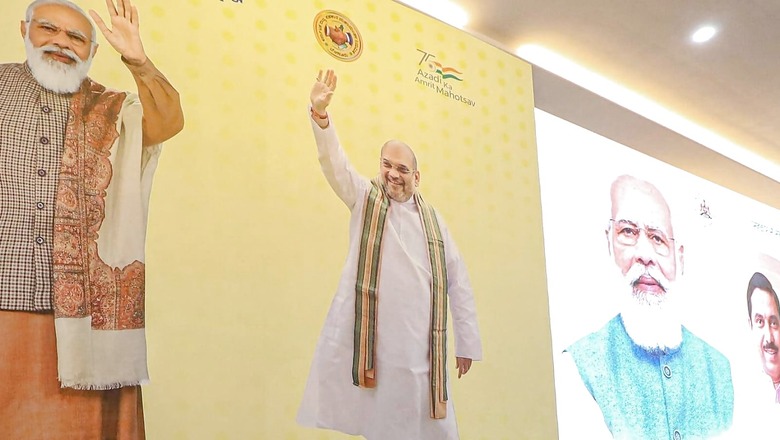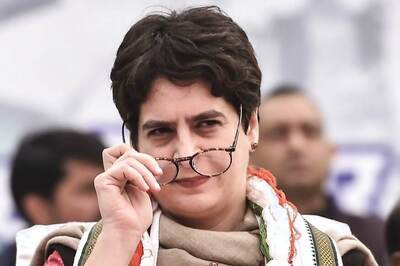
views
Amit Shah’s visit to Karnataka’s Siddaganga Mutt in Karnataka’s Tumakuru today, an influential Lingayat religious institution, holds much significance especially in the background of the political developments in the state.
Shah will be attending the 115th birth anniversary of Sri Shivakumara Swami, who was popularly called the ‘Walking God’ for the social services rendered to people through the mutt’s administration. Sri Shivakumara Swami passed away in 2019 at the age of 111 and the reins of the mutt has been taken over by Sri Siddalinga Swami.
Shah’s visit is being seen as the BJP’s central leadership’s open message to the Lingayat community that the party will continue to support the community and its aspirations.
This confidence-building exercise is meant to remove any misgivings in the Lingayat community after the party replaced BS Yediyurappa with Basavaraj Bommai as the chief minister. Lingayats constitute close to 17% of the Karnataka’s population and Yediyurappa is considered one of the tallest leaders of the community.
Incidentally, Yediyurappa and his son Vijayendra are the chief organisers of the birth anniversary celebrations of the ‘Walking God’ in Tumakuru.
Meanwhile, Congress leader Rahul Gandhi visited the Siddaganga Mutt on Thursday and met Siddalinga Swami. Gandhi’s visit is seen as the party’s attempt to woo the Lingayat community ahead of the 2023 state assembly election.
The Powerful Mutts of Karnataka
Karnataka has more than 500 mutts and a little over a dozen of them are perceived to be highly influential. In recent years, several mutts or religious institutions have begun openly supporting a particular politician or party, some have even endorsed candidates, campaigned for them, while others have lobbied for party tickets.
Religious leaders of these mutts represent different communities such as Lingayats, Vokkaligas and Other Backward Castes. These religious institutions are known for their extensive work to provide food, education and employment to the socially and economically backward people.
It is a common practice in Karnataka for leaders across party lines to visit mutts of various communities, particularly those that belonged to the Lingayats and Vokkaligas, the two major upper caste groups in the state.
Lingayats constitute about 17% and the Vokkaligas around 15% of the state’s population. Politicians visit the mutts of these two influential communities to garner support for their parties particularly during the election time.
Shah’s visit to the Tumakuru mutt is being perceived as the BJP’s move towards cobbling up the support of the Lingayats in the state before the assembly election, which is expected to be held next year.
The Clout of BS Yediyurappa
In July last year, pressure mounted on the BJP top brass to replace the 78-year-old Yediyurappa as the chief minister. The party’s ‘unwritten’ rule of promoting all leaders above the age of 75 years to the ‘Margdarshak Mandal’ (guidance panel) did not seem to apply to Yediyurappa as he remained the tallest and most loved politician in the Lingayat community. At the age of 78, Yediyurappa continued as the CM, but allegations of corruption and high-handedness by his son Vijayendra in the administration, including transfers of bureaucrats, began to do the rounds.
Unable to ignore the mounting complaints, the BJP’s central leadership persuaded Yediyurappa to step down as the CM. Lingayat mutt leaders were unhappy with the move to replace Yediyurappa who continues to be the tallest leader of the community. The heads of all Lingayat mutts in Karnataka unitedly made an appeal to the BJP central leadership not to replace Yediyurappa, a support that no other leader in the party enjoys to date.
This is also a major reason why Yediyurappa was able to communicate and convince the BJP central leadership on making Basavaraj Bommai as his successor. In order to ensure that the Lingayat vote bank remain intact and not further offend the community, Yediyurappa’s choice was accepted.
Siddaganga Swami: Most Loved and Powerful Lingayat Seer
Popularly known as the ‘Nadedaduva Devraj’ or ‘Walking God’ for his humanitarian work, the Lingayat Swami played an important role in shaping the future of Karnataka politics. Such was the influence of the mutt that leaders across party lines, Prime Ministers such as Indira Gandhi, Narendra Modi, would seek his blessings from the pontiff to safeguard their political future.
A strong proponent of Lingayatism, Shivakumara Swami was born in 1907 and was ordained a monk at the age of 23. The Padma Shri recipient was extremely popular especially for his work in the field of education. His untiring efforts to provide good education and nutrition to the students from all socio-economic backgrounds made him well-loved amongst people.
While politicians would line up to seek the blessings of the pontiff, the “politically influential” Shivakumara Swami did not openly take sides, he always remained neutral. Though each time a politician was seen seeking blessings of the mutt head, it is perceived as an indirect message to the Lingayats that they have the support of the Siddaganga mutt.
How Mutts Have Influenced Karnataka politics
In 2008 when the BJP opened its account in the south, then chief minister BS Yediyurappa had famously commenced his political campaign from this Lingayat mutt.
In the peak of the controversy over declaring the Lingayat as a religion, a statement by then Congress minister MB Patil claiming that the Siddaganga seer had approved a separate religion tag for Lingayatism. A letter from the seer’s office debunking this claim hurt the Congress, which earned the tag of trying to break the community that wanted to remain united.
In 2019, when the HD Kumaraswamy-led coalition government began to totter a visit to the Vokkaliga mutt by the leader sent out a stern message. The head seer of the Vokkaliga mutt issued a veiled warning that any move to destabilise the government led by Kumaraswamy, a Vokkaliga leader, will not be tolerated.
Despite the warning, Kumaraswamy’s government fell after the JD(S)-Congress coalition lost the trust vote in the state assembly.
Another example of the Siddaganga mutt’s influence in political decision-making was in 2014, when the Siddaramaiah-led Congress government in the Karnataka Hindu Religious and Charitable Endowments (Amendment) Bill sought to bring educational institutions run by mutts and other religious groups under their control. Seers across the state opposed the move and the government was forced to drop the Bill in 2017 and face the voters.
Read all the Latest Politics News and Breaking News here




















Comments
0 comment